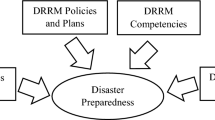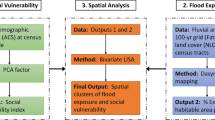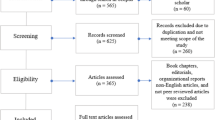Abstract
Households’ links with local Government provide important support for disaster resilience and recovery on the Bangladeshi coast. Few previous studies of disaster resilience and recovery have explored how linking social networks—and in particular local government—contribute. Using household surveys, focus groups, and key informant interviews, we examine strengths and weaknesses of local government’s contribution, using two cyclone-affected coastal villages as case studies. The findings show that local government provides important support, for example relief distribution, livelihood assistance, and reconstruction of major community services. However, patronage relationships (notably favouring political supporters) and bribery play a substantial role in how those responsibilities are discharged. The equity and efficiency of these contributions to recovery are markedly diminished by corruption. Reducing corruption in UP’s contributions to disaster recovery could significantly improve resilience; however, general reform of governance in Bangladesh would needed to bring this about.

Source: Banglapedia 2006

Source: CEGIS, 2008
Similar content being viewed by others
Notes
Jatka is the younger size of Hilsha (national fish of Bangladesh). Jatka rice is an incentive of the Bangladesh Government. To support the ban on jatka fishing, the local government distributes monthly 30 kg of rice (locally known as jatka chal) as an incentive to the fishermen during mid-February to late June (Magh-Asar).
VGF is a social safety-net program of the Bangladesh Government. It is an emergency aid during and after disasters. This program currently provides food subsidy (rice) to the poorest in the community.
The UDMC consists of the UP Chairman as the chairperson and members comprising all the government department heads at Union level, Members of UP, representatives of women, peasants, and fishermen and freedom fighters, NGO officials working in respective Unions and local civil society members.
Fitra is a gift of food or money that each matured Muslim individual pays on the day of Eid-ul-Fitr (a large religious celebration after Ramadan). This is a charitable tax to be paid to the poor people, which is obligatory in Islam.
References
Alam K, Rahman MH (2014) Women in natural disasters: a case study from southern coastal region of Bangladesh. Int J Disaster Risk Reduct 8:68–82
Aldrich DP (2010) Fixing recovery: social capital in post-crisis resilience. Department of Political Science. http://docs.lib.purdue.edu/pspubs/3. Accessed 13 Dec 2014
Asian Development Bank (2004) Local governance and service delivery to the poor: Bangladesh Case Study. Manila
Bangladesh Meteorological Department (2013) Named cyclone over Bay of Bengal during 2005—till date. Ministry of Defence, Government of the People’s Republic of Bangladesh, Dhaka
Bardhan P (1997) Corruption and development: a review of issues. J Econ Lit 35:1320–1346
Callahan WA (2005) Social capital and corruption: vote buying and the politics of reform in Thailand. Perspect Polit 3:495–508
Chambers R (1983) Rural development: putting the last first. Prentice Hall, New Nersey
Chamlee-Wright E (2010) The cultural and political economy of recovery: social learning in a post-disaster environment. Routledge, New York
Chamlee-Wright E, Storr VH (2011) Social capital as collective narratives and post-disaster community recovery. Sociol Rev 59:266–282
Creswell JW, Clark VLP (2007) Designing and conducting mixed methods research. Sage, Thousand Oaks. doi:10.1111/j.1753-6405.2007.00097.x
Dasgupta S, Huq M, Khan ZH, Ahmed MMZ, Mukherjee N, Khan MF, Pandey K (2014) Cyclones in a changing climate: the case of Bangladesh. Clim Dev 6:96–110. doi:10.1080/17565529.2013.868335
Disaster Management Bureau (2010) Standing orders on disaster. Ministry of Food and Disaster Management, Disaster Management and Relief Division, Government of the People’s Republic of Bangladesh, Dhaka
George BP (2008) Local community’s support for post-tsunami recovery efforts in an agrarian village and a tourist destination: a comparative analysis. Commun Dev J 43:444–458
Hardoon D (2011) Daily lives and corruption: Public opinion in South Asia. Transparency International Berlin
Hawkins RL, Maurer K (2010) Bonding, bridging and linking: how social capital operated in New Orleans following Hurricane Katrina. Br J Soc Work 40:1777–1793
Islam MR (2010) Building disaster resilient coastal community in a multi-hazard prone area of Bangladesh. Disaster Preparedness, Mitigation and Management, Asian Institute of Technology, Thailand
Islam R, Walkerden G (2014) How bonding and bridging networks contribute to disaster resilience and recovery on the Bangladeshi coast. Int J Disaster Risk Reduct 10:281–291
Islam R, Walkerden G (2015) How do links between households and NGOs promote disaster resilience and recovery? A case study of linking social networks on the Bangladeshi coast. Nat Hazards 78:1707–1727. doi:10.1007/s11069-015-1797-4
Khan AI (2013) Report on functionality assessment of union disaster management committees. Dhaka
Khan MI, Islam M (1991) The impact of local elites on disaster preparedness planning: the location of flood shelters in Northern Bangladesh. Disasters 15:340–354
LaLone MB (2012) Neighbors helping neighbors: an examination of the social capital mobilization process for community resilience to environmental disasters. J Appl Soc Sci 6:209–237
Levi M (1996) Social and unsocial capital: a review essay of Robert Putnam’s making democracy work. Polit Soc 24:45–55
Mahmud T, Prowse M (2012) Corruption in cyclone preparedness and relief efforts in coastal Bangladesh: lessons for climate adaptation? Glob Environ Change 22:933–943
Mallick B, Witte SM, Sarkar R, Mahboob AS, Vogt J (2009) Local adaptation strategies of a coastal community during cyclone Sidr and their vulnerability analysis for sustainable disaster mitigation planning in Bangladesh. J Bangladesh Inst Plan 2:158–168
Minamoto Y (2010) Social capital and livelihood recovery: post-tsunami Sri Lanka as a case. Disaster Prev Manag 19:548–564
Multi Task (2009) Post-Sidr damage and loss: a report of Patharghata Upazila. Patharghata, Bangladesh
New Age (2007) Relief supplies pile up while many survivors go hungry. Dhaka
Paul SK, Routray JK (2013) An analysis of the causes of non-responses to cyclone warnings and the use of indigenous knowledge for cyclone forecasting in Bangladesh. In: Filho WL (ed) Climate change and disaster risk management. Springer, London, pp 15–39
Paul SK, Paul BK, Routray JK (2012) Post-Cyclone Sidr nutritional status of women and children in coastal Bangladesh: an empirical study. Nat Hazards 64:19–36
Pérez-Díaz V (2002) From civil war to civil society. In: Putnam RD (ed) Democracies in flux. Oxford University Press, New York, pp 245–288
Pouliotte J, Smit B, Westerhoff L (2009) Adaptation and development: livelihoods and climate change in Subarnabad. Bangladesh Clim Dev 1:31–46
Putnam RD (1995) Bowling alone: America’s declining social capital. J Democr 6:65–78
Putnam RD (2000) Bowling alone: the collapse and revival of American community. Simon and Schuster, New York
Rotberg FJ (2010) Social networks and adaptation in rural Bangladesh. Clim Dev 2:65–72
Schutt RK (2011) Investigating the social world: the process and practice of research. Pine Forge Press, Thousand Oaks
Svendsen GT (2003) Social capital, corruption and economic growth: eastern and western Europe. The Danish Social Capital Project. http://econpapers.repec.org/paper/hhsaareco/2003_5F021.htm. Accessed 2 April 2015
Tanzi V (1998) Corruption around the world: causes, consequences, scope, and cures. IMF Staff Pap 45:559–594
Tse CW, Wei J, Wang Y (2013) Social capital and disaster recovery: evidence from Sichuan earthquake in 2008. Center for global development. http://www.cgdev.org/publication/social-capital-and-disaster-recovery-evidence-sichuan-earthquake-2008-working-paper-344. Accessed 13 Dec 2014
Yamane T (1973) Statistics: an introductory analysis. Harper & Row, New York
Zafarullah H, Siddiquee NA (2001) Dissecting public sector corruption in Bangladesh: issues and problems of control. Public Organ Rev 1:465–486
Zaman I, Das SK, Islam SL (2011) UN convention against corruption civil society review: Bangladesh 2011. Transparecy International Bangladesh, Dhaka
Acknowledgments
The authors are grateful to Macquarie University, Australia, as this study was supported with an International Macquarie University Research Excellence Scholarship. Special thanks to disaster practitioners and policymakers, Upazila Nirbahi Officer and Cyclone Preparedness Programme, Patharghata, the local NGOs and journalists for their kind support during fieldwork between February and July 2013.
Author information
Authors and Affiliations
Corresponding author
Rights and permissions
About this article
Cite this article
Islam, R., Walkerden, G. & Amati, M. Households’ experience of local government during recovery from cyclones in coastal Bangladesh: resilience, equity, and corruption. Nat Hazards 85, 361–378 (2017). https://doi.org/10.1007/s11069-016-2568-6
Received:
Accepted:
Published:
Issue Date:
DOI: https://doi.org/10.1007/s11069-016-2568-6




